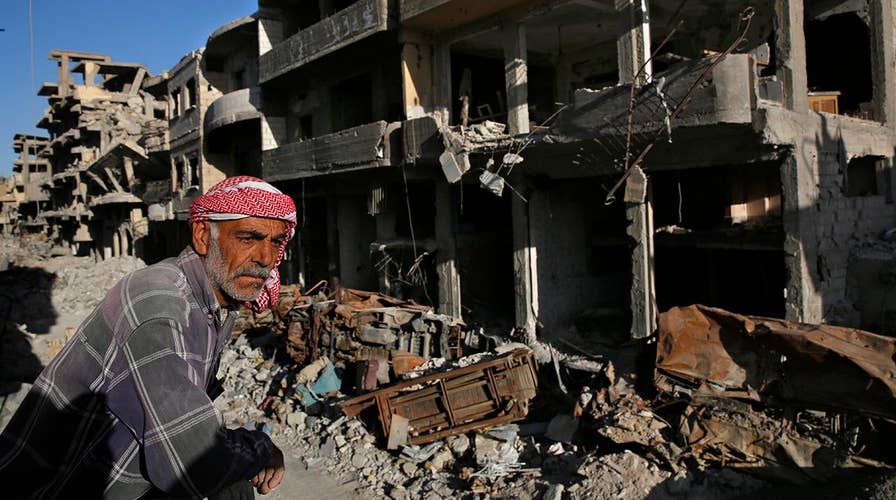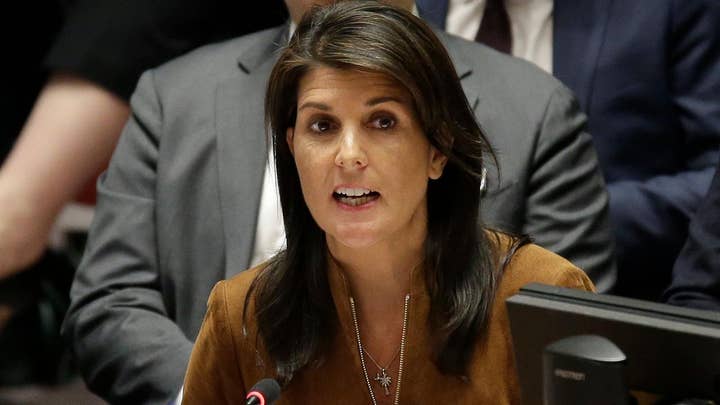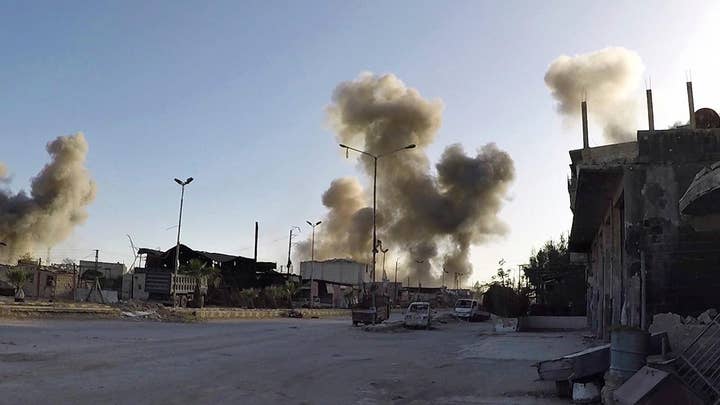Timeline of US policy toward Syria
For the U.S., Syria presents a complicated challenge: defeating ISIS, countering Russia and Iran, while somehow promoting stability; Rich Edson reports from the State Department.
As President Donald Trump on Monday warned he soon would be making “major decisions” to respond “forcefully” to murderous suspected chemical attacks against civilians in the rebel-held Syrian town of Douma, the stakes for the United Nations in the made-in-Syria crisis were just as high.
Nikki Haley, U.S. Ambassador to the U.N., passionately outlined the challenge for the world organization at an emergency meeting of the Security Council, called to debate what to do next about the April 7 chemical assault by the regime of Bashar al-Assad.
The attack is believed to have killed more than 40 people, including numerous women and children, and left perhaps 100 more injured.
“We have reached the moment when the world must see justice done,” Haley warned. “There can be no more rationalizations for our failure to act.”
“History will record this,” she declared, “as the moment when the Security Council either discharged its duty or demonstrated its utter and complete failure to protect the people of Syria.”
“Either way,” Haley summarized, “the U.S. will respond.”
What that U.S. action will be, and when it will occur, Trump promised to reveal shortly, though “after the fact,” as he told journalists.
But the U.N.’s haplessness in confronting chemical assaults and numerous other war crimes by Assad’s forces, backed by Russian warplanes and Iranian-supported militias, has reached its own high-water mark, culminating in the emergency Council session and anything that occurs after it.
As a result of that cynical war of attrition behind diplomatic cover, “the U.N. is worse than meaningless,” Frederick Kagan, resident scholar and director of the Critical Threats project at the American Enterprise Institute, told Fox News days in advance of the latest chemical attack. “It is allowing itself to be manipulated as cover for atrocities and war crimes.”
Kagan called diplomats “foolishly naïve” for accepting previous resolutions that endorsed a tattered ceasefire and virtually non-existent “de-escalation zones” that Assad and his backers had repeatedly violated at will.
“The Russians always intended to violate them,” he said.
Yesterday at the Security Council, Haley essentially agreed. Charging that the hands of Putin’s regime “were all covered in the blood of Syrian civilians,” she declared. “Russia could stop this senseless slaughter if it wanted. But it stands with the Assad regime and supports [it] without any hesitation.”
CLICK HERE FOR HALEY’S FULL REMARKS.
For his part, Russian Ambassador to the U.N. Vassiley Nebenzia denied outright that anything at all had happened.
“Our military radiological, biological chemical unit was on site of the alleged chemical accident,” he told the Council. “It confirmed there was no chemical substances found — no bodies, no poisoned people in hospitals, doctors in Douma denied that anyone was coming to hospital.”
Some diplomats took the statement to mean that the area already had been scrubbed of chemical residues.
The tenuous, Security Council-endorsed 30-day ceasefire that ultimately was shredded by Assad’s air raids and military attacks in the rebellious suburban region of eastern Ghouta, in which Douma also is located, already has known countless violations of humanitarian law.
The assaults have including numerous alleged chlorine gas attacks as well as bombing raids on civilian hospitals and other vulnerable areas, which have been a signature tactic of Assad’s forces, and those of his allies, for years. In recent weeks the pounding in eastern Ghouta left hundreds dead and unknown numbers injured.
Russia had joined in a unanimous endorsement of the ceasefire at the Security Council, but as Haley observed, immediately began violating it.
“Russian officials are on the ground helping direct the regime’s ‘starve and surrender’ campaign,” she declared, “and Iranian allied forces do much of the dirty work. When the Syrian military pummels civilians, they rely on the military hardware given by Russia.”
Diplomatic obstruction by Russian president Vladimir Putin whittled the ceasefire down to meaningless five-hour pauses in the Assad attacks until population centers in East Ghouta began to surrender. Their submission was followed by mass deportations of civilian residents, reports of summary executions, and a continuation of near-starvation conditions among survivors.
Then, after a brief pause, the assault started again on Douma, culminating in the latest chemical massacre.
What Haley and the U.S. were asking the U.N. Security Council to provide today is, in part, something the U.N. already had done less than a year ago — establish a “truly professional and impartial mechanism” to investigate chemical weapons attacks in Syria as well as demand “unrestricted humanitarian access” to Douma, which has been under siege by the regime of Syrian president Bashar Al-Assad since April 2013.
A U.S. draft resolution also voiced the Council’s “outrage that individuals continue to be killed and injured by chemical weapons in the Syrian Arab Republic, and expresses its determination that those responsible must be held accountable.”
For his part, Russia’s U.N. ambassador declared the U.S. draft contained “unacceptable elements,” and eventually vetoed the proposed measure. A much weaker Russian counter-proposal, which would not provide for assigning responsibility for the attack, failed for lack of a Council majority, without a U.S. veto.
Yet another Russian and Swedish-sponsored compromise resolution also failed.
By contrast, a strong Security Council-approved impartial mechanism, known as the Joint Investigative Mechanism, or JIM, formally reported last June, that deadly sarin gas, a banned chemical weapon, had been used in an attack on the Syrian town of Khan Shaykhun, leaving at least 74 dead and more than 550 injured. The report made clear that the only real suspects were Assad’s air forces, which were backed up over Khan Shaykhun’s skies by Russian warplanes.
Jointly-sponsored both by the U.N. and the OPCW, the JIM by its nature immediately put the weight of the international community behind its findings.
Two days after the chemical attack, and long before the JIM report appeared, the Trump Administration fired some 50 Tomahawk cruise missiles at a Syrian air force base where he said the sarin attack was launched. It was, he said, “in this vital national security interest of the United States to prevent and deter the spread of deadly chemical weapons.”
The main outcome: in October, 2017, Russia vetoed a resolution that would have extended the JIM’s mandate for another year. The mechanism ceased to exist in November — and in January, February and March, 2018, at least five chlorine gas attacks were reported to have taken place in or around Douma.
In fact, Haley asserted in the Security Council: “Since the Assad regime used chemical weapons at Khan Shaykhun one year ago, chemical weapons have been reportedly used dozens of times. And this Council does nothing.”
Throughout the months of growing crisis over Assad’s continued assaults, the U.N.’s pronouncements have mainly revolved around hopes for a peace process orchestrated by Russia and Iran, in tandem with Turkey, that have done little more than freeze facts on the ground between rounds of Russian-backed regime attacks. The U.N. has also made largely ineffectual appeals to get humanitarian aid to starving, rebel-held besieged areas in East Ghouta and elsewhere.
As recently as March 29, after a meeting with Russian Federation defense minister Sergey Shoigu, the U.N.’s special envoy for Syria, Staffan de Mistura, announced that “this is the fourth time we are having a useful, and in my opinion, very constructive discussion with Minister Shoigu” — about humanitarian access to eastern Ghouta and Douma, and “the way to ensure the protection of civilians.” None of those conversations had led to much.
For his part, Secretary General Guterres has mainly issued carefully modulated statements of concern. When the April 7 chemical attack occurred, Guterres was on his way to a visit with Chinese president Xi Jinping. After he arrived in Beijing, his spokesperson issued a statement declaring the Secretary General was “deeply concerned about renewed and intensive violence in Douma, and particularly alarmed by allegations that chemical weapons have been used against civilian populations in Douma.”
The spokesperson said that Guterres was “particularly alarmed” by the allegations of chemical weapons use, but added carefully that “while the United Nations is not in a position to verify these reports, the Secretary-General notes that any use of chemical weapons, if confirmed, is abhorrent, and requires a thorough investigation.”
Due to the Russian intransigence, however, any investigation would not be carried out by a fact-finding mechanism used in the past, but only by the Hague-based Organisation for the Prohibition of Chemical Weapons (OPCW), a multilateral but non-U.N. body that operates under the 1997 Chemical Weapons Convention — and which partnered with the U.N. in the ill-fated JIM.
Guterres’ spokesperson emphasized that right now “it’s in the hands of the OPCW” — although “if the U.N. in Syria can be helpful in any way, we will do so.”
The OPCW’s director-general, Ahmet Uzumcu, has expressed his “grave concern” regarding the April 7 Douma attack, and said the organization’s Fact-Finding Mission would report its findings — he did not say when — to the “states parties to the Chemical Weapons Convention.”
Critics have long argued the U.N. in Syria has been tacitly supportive of the Assad regime, by funneling much of its humanitarian aid through regime-dominated organizations and acquiescing in the removal of medical and other critical supplies from a handful of relief convoys that managed to get Assad’s permission to reach long-besieged areas such as eastern Ghouta.
“The U.N. has failed miserably multiple times,” observes Zaher Sahloul, president and co-founder of MedGlobal, a non-government organization that has trained medical personnel in Syria as well as elsewhere. “Most U.N. assistance is channeled into regime-controlled areas. The regime uses its own budget to buy weapons.”
Even on symbolic levels, the sprawling and uncoordinated U.N. array of organizations has been unable to distance itself from the Syrian regime.
This week, the Geneva-based gadfly organization U.N. Watch tried to raise a fuss about the fact that Syria’s representative is slated to take over in May the monthly rotating presidency of the Conference on Disarmament, a 65-member U.N. body that debates “practically all multilateral arms control and disarmament problems,” according to its website.
The Conference boasts that it originally negotiated the Convention on the Prohibition of the Development, Production, Stockpiling and Use of Chemical Weapons and on their Destruction — which is now governed by another U.N.-supported organization in which Syria is also a member.
U.N. Watch has called for the U.S., the European Union and U.N. Secretary General Guterres to protest the Syrian presidential rotation and boycott proceedings during the Syrian tenure. But stopping Syria from taking the disarmament post is pretty much impossible. The rules of the Conference on Disarmament provide that the presidency rotates on a strictly alphabetical basis among its member states, unless the selected member state chooses otherwise.
In fact, Syria held the presidency of the Conference on Disarmament once before, in 2007. As it happens, that was the year in which Israel successfully bombed a clandestine nuclear reactor Syria was building with the aid of the world’s most dangerous nuclear proliferator, North Korea.
North Korea, in turn, assumed the presidency of the Conference on Disarmament in 2011.
That artificial equal status among U.N. member states was further underlined in March by a panel of experts who monitor U.N. sanctions against North Korea.
In a lengthy report largely focused on sanctions evasion, the experts took note of the surprising behavior of the U.N.’s Geneva-based World Intellectual Property Association, which had facilitated an international patent by North Korea for the industrial production of sodium cyanide — which can be used in the production of the nerve gas Tabun.
WIPO had not felt it necessary to advise the sanctions experts about the patent, even though sodium cyanide was explicitly named on U.N. sanctions lists as a banned chemical. At the time, a WIPO spokesperson told Fox News that: “We communicate with the relevant U.N. oversight committees as necessary.”
The sanctions panel, however, found WIPO’s judgment to be in error. Moreover, the experts noted that when they asked WIPO to provide information on the patent inventors and their North Korean affiliations, WIPO said the information was not required in their patent application form.
The panel noted dryly that “this makes it impossible to determine whether the inventors from [North Korea] were affiliated” with any organizations or individuals on U.N. sanctions lists.
The panel of experts “recommended” that WIPO do better in the future.
In the gruesome aftermath of Syria’s most recent chemical weapons atrocities, the stakes — for the U.N. and for the world — are much, much higher.
Fox News’ Ben Evansky contributed to this report.





